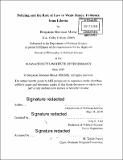Policing and the rule of law in weak states : evidence from Liberia
Author(s)
Morse, Benjamin Sherman.
Download1136158843-MIT.pdf (17.29Mb)
Other Contributors
Massachusetts Institute of Technology. Department of Political Science.
Advisor
Lily L. Tsai.
Terms of use
Metadata
Show full item recordAbstract
How can states with limited resources build citizens' trust in the police? How can they ensure the primacy of the police and courts over customary alternatives in peripheral regions long accustomed to autonomy? In urban areas plagued by high levels of crime and insecurity, how can they reduce reliance on vigilantism and extrajudicial justice? My dissertation explores these questions through a series of three essays on policing in Liberia. The first reports results from a large-scale, randomized control trial evaluation of the Liberian National Police's "Confidence Patrols" community policing program in rural Liberia. I find that the program was successful at increasing knowledge of the police and courts, enhancing security of property rights, and increasing crime reporting, but that it also led to backlash from customary chiefs and members of Liberia's traditional society (who are privileged under customary law), possibly because they felt their interests would be threatened by greater access to the state. My second paper evaluates the effectiveness of community policing in the urban setting, with a particular focus on whether community policing combined with the opportunity to form "Watch Forums" can redirect communities away from vigilantism towards lawful activities that complement the efforts of police. I find that the intervention improved police-community relations, reduced support for vigilantism, and mobilized communities to participate in the Watch Forum initiative. I further find that these improvements were accompanied by a roughly 40 percentage point reduction in the incidence of mob violence. I conclude that integrating local communities into formal policing practices is a potentially promising strategy for reducing vigilantism and promoting compliance with the rule of law in countries like Liberia. The third and final paper tests whether citizens expect the police to discriminate against victims of crime on the basis of their class, religion, or (lack of) personal connections to powerful government officials, and whether this in turn discourages crime reporting. I find that citizens expect discrimination on the basis of class and political connections, but that these expectations do not appear to influence the likelihood of crime reporting among actual victims of crime.
Description
Thesis: Ph. D., Massachusetts Institute of Technology, Department of Political Science, 2019 Cataloged from PDF version of thesis. Includes bibliographical references (pages 269-280).
Date issued
2019Department
Massachusetts Institute of Technology. Department of Political SciencePublisher
Massachusetts Institute of Technology
Keywords
Political Science.